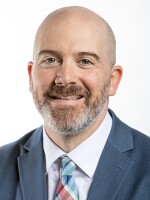ARI SHAPIRO, HOST:
North Carolina's governor called the legislature into special session today, the fifth this year. The purpose was to repeal House Bill 2, the law that limits protections for LGBT people. It's known as the bathroom bill. Yet tonight, the North Carolina Senate adjourned without taking a vote.
To tell us what this means and where the effort might go next, we're joined by Jeff Tiberii, state house reporter with member station WUNC. Hi, Jeff.
JEFF TIBERII, BYLINE: Hello, Ari.
SHAPIRO: We have been talking with you throughout the evening. Senators seemed close to passing something, then what happened?
TIBERII: (Laughter) Well, they ended up not passing anything and not sending any legislation over to the House. Now, we may never know exactly why that was. Is this a joint effort because they didn't have the votes in the House and they wanted to kill it before it got there, or was it something else? (Laughter) There's a whole lot of conjecture, and certainly the blame game has started here in North Carolina. I don't expect that to end any time soon.
After the session adjourned tonight, Republican lawmakers in the Senate were very quick to pivot, turn the focus and the blame back on the Charlotte City Council and also on Democratic Governor-elect Roy Cooper. Phil Berger, who is the leader of that chamber, really the most powerful politician in North Carolina, had this to say moments after the session ended and there was no repeal of House Bill 2.
(SOUNDBITE OF ARCHIVED RECORDING)
PHIL BERGER: One side of this equation does not want to repeal House Bill 2. They want House Bill 2 as an issue just as it was an issue in the campaign.
TIBERII: Now, to be clear, House Bill 2 has been a wedge issue. It has been a shiny object. And I don't say that insensitively, but it has been something that both sides have used to rile up their bases as it pertains to elections, and it is the case for now. No deal has been reached, and we're going to see this - more of this moving into 2017.
SHAPIRO: But Jeff, help us understand. The outgoing governor is Republican. The legislature is overwhelmingly Republican. Why couldn't Republicans just get together and do this?
TIBERII: That's a great question. And that's a question I posed to Berger and some of the most powerful members of the House Chamber as well. And they were very quick to adjust and say that, you know, there's a trust issue with the folks of Charlotte.
Charlotte, earlier this week, listeners might remember, agreed to repeal the city council ordinance there. So they were first going to do a rescind of the local ordinance, and then a state repeal was going to follow. State lawmakers...
SHAPIRO: This is the local ordinance that protected...
TIBERII: Yeah.
SHAPIRO: ...LGBT rights.
TIBERII: Correct, that protected individuals who - transgender people. And what happened after the failure to repeal tonight was kind of a blame game, and they shined the light back on Charlotte. And they said that Charlotte was disingenuous in which the way it repealed.
But to your point, this is a bit of a distraction - right? - because there are supermajorities in both chambers. And as we've seen over the last four years, if this general assembly wants to get something done, they get it done. And tonight, they did not do that.
SHAPIRO: What are the larger implications of this? This bill, though - it's known as the bathroom bill - is actually far more sweeping than that.
TIBERII: It is. It's absolutely far more sweeping, and it's truly a black eye for the state in many ways. After the session tonight, I spoke with Pricey Harrison, who's a Democrat from Guilford County, and she said that this was just overall a pretty lousy day for her and her colleagues.
PRICEY HARRISON: I don't like to assign blame necessarily. I just think it was a really unfortunate day for North Carolina that we could not remove this stain from our state. It's just a - I was telling somebody I feel like I've been a funeral. And we had a chance to take our state back, and we lost it.
TIBERII: So Democratic Governor-elect Roy Cooper is coming in, and this is going to continue to be an issue between Democrats and Republicans, the executive branch and the legislature. And this comes just a week after Republicans held a different special session to strip that Democratic governor-elect of some of his power - so really wild political times down here.
SHAPIRO: Jeff Tiberii of member station WUNC speaking with us from the state legislature in Raleigh, N.C. Thank you, Jeff.
TIBERII: Ari, my pleasure. Transcript provided by NPR, Copyright NPR.



